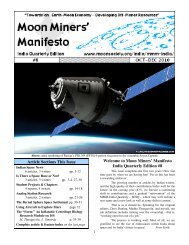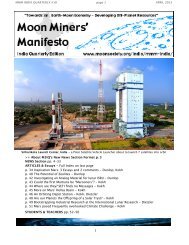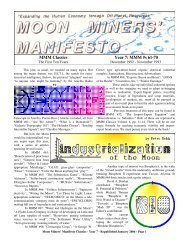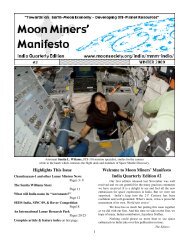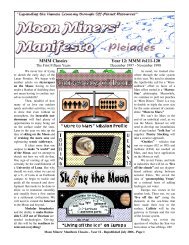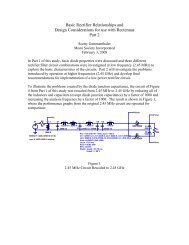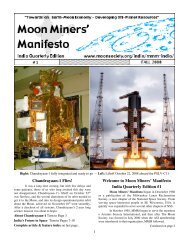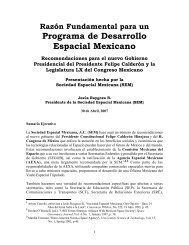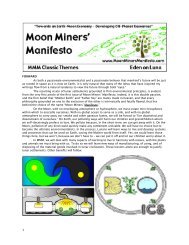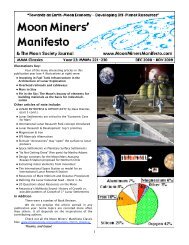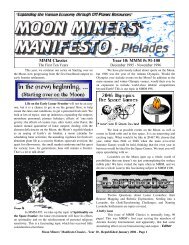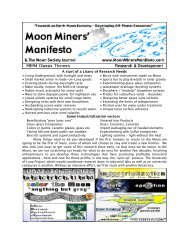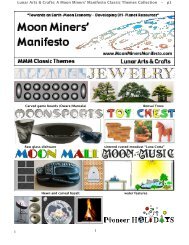Space Transportation - mmmt_transportation.pdf - Moon Society
Space Transportation - mmmt_transportation.pdf - Moon Society
Space Transportation - mmmt_transportation.pdf - Moon Society
You also want an ePaper? Increase the reach of your titles
YUMPU automatically turns print PDFs into web optimized ePapers that Google loves.
Meanwhile, the original second stage, which delivers the moon-bound stack to Earth orbit, should itself be<br />
predesigned so that all its components can serve some useful function in Earth orbit, building up the <strong>transportation</strong><br />
hub with refueling, assembly, and maintenance operations functions. We’ve already paid the freight to deliver its fuelexpended<br />
dry mass to LEO. If we do not leave it there and find someway to use it to ramp up orbital operations, we are<br />
just tossing money away. Here too, we can treat the Mass Fraction limits.<br />
It begins to look as if the Mass fraction rule was a product of neanderthal thinking. We got to where we are by<br />
taking advantage of every opportunity, not by mindlessly throwing opportunities away, because in our narrow horseblindered<br />
professions we can’t see the possibilities!<br />
Next Month, Part 3 - Bootstrapping through LEO and LLO with early lunar products. <br />
MMM #211 - December 2007<br />
THINKING OUTSIDE THE MASS FRACTION BOX: 3<br />
The Block & Tackle Pulley as an Analogy of the Power of Leveraging<br />
Concurrent <strong>Space</strong> Developments to deliver much more to the <strong>Moon</strong><br />
By Peter Kokh<br />
“ in Earth orbit you are halfway to anywhere” - Robert A. Heinlein<br />
The “effective” cost of goods delivered to the lunar surface<br />
depends on the amount, or lack of infrastructure along the way.<br />
Archimedes invention of the pulley more than 2200 years ago is one of the most important mechanical<br />
contributions to early civilization. By realizing a predictable mechanical advantage, the “energy cost” of moving an<br />
object from one plane, say Earth’s surface, to another, say the <strong>Moon</strong>’s surface is significantly reduced. The block and<br />
Tackle pulley multiplies the advantage.<br />
What does this have to do with space <strong>transportation</strong> in general, and with the cost of delivery of goods from<br />
Earth to the <strong>Moon</strong> in particular? We certainly are not talking about setting up a physical block and tackle system in<br />
space! Rather we want to apply the analogy above in a way that illuminates the best way for us to proceed.<br />
In short, transporting things to the <strong>Moon</strong> without any intervening infrastructure, i.e. not cashing in any<br />
infrastructure discounts or advantages, is going to remain very expensive. The “<strong>Moon</strong> Direct” plan, if we can call it<br />
that, is the “horse blinder” choice. “We are directed to put an outpost on the <strong>Moon</strong>, not to establish infrastructure<br />
along the route.” What looks like dedication will someday reveal itself to be an outright waste of resources and<br />
opportunities. Future Lunans may even view it as criminal.<br />
In previous parts of this article, we have noted that anything taken to orbit that might be useful in setting up<br />
shop on the <strong>Moon</strong>, but left to fiery destruction as its orbit decays, could be taken to the <strong>Moon</strong> at much less expense<br />
from LEO than from Earth’s surface - if Heinlein is right, for about half the cost. And that includes a lot of material,<br />
whether usable in its current form or not. The deliberate “wasting” of the External Tank is but the most obvious and<br />
long standing forfeit of opportunity. We fully understand all the disadvantages and obstacles to reusing the ET. But<br />
they are insignificant in comparison to what could have been gained by commit-ting to the modest expense of parking<br />
them in a higher very long duration orbit until the opportunity to use them in LEO or take them to the <strong>Moon</strong> arose. As<br />
a <strong>Society</strong>, we have become addicted to favoring short-term advantages over long-term goals, and such a habit, if we<br />
don’t fight the addiction, could have us following the Romans into oblivion. Again, I understand the excuses. But<br />
excuses are just what they are.<br />
The same holds true of anything else delivered to LEO and GEO, which when no longer useful there, could be<br />
delivered to the <strong>Moon</strong> at “half the cost.” LEO and GEO are pulleys in any future fully developed lunar <strong>transportation</strong><br />
74



